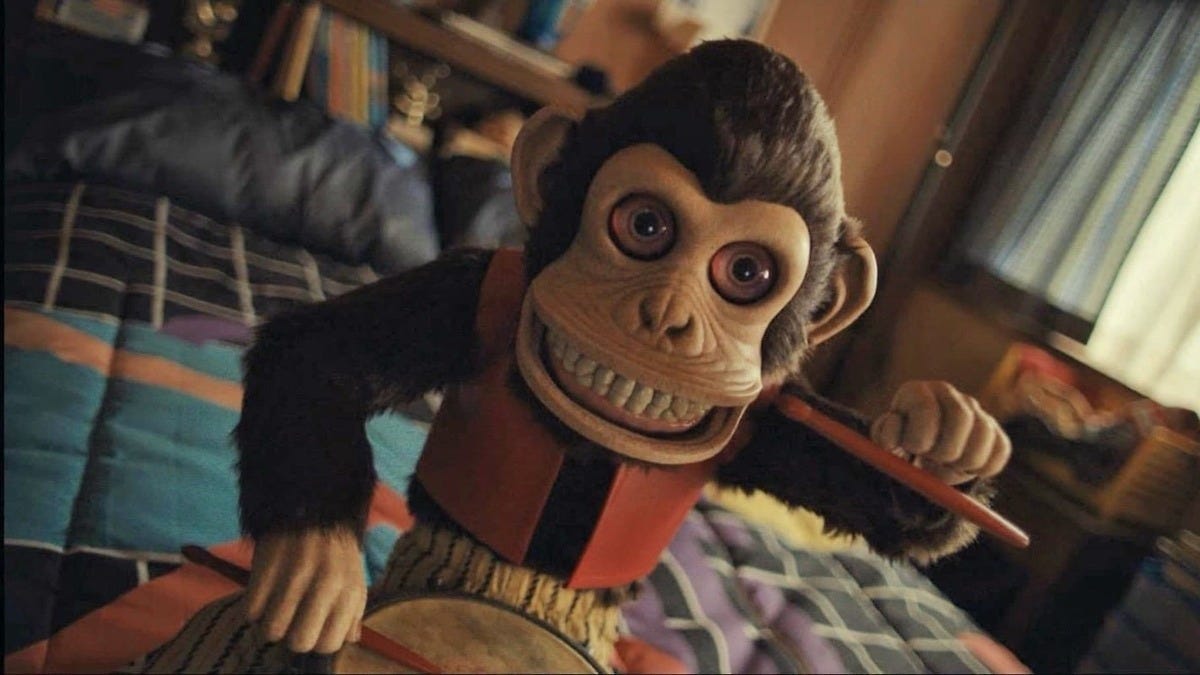'The Monkey' Review: Stephen King Adaptation Drums Up a Jumble
Osgood Perkins's latest clashes with King's storytelling for a movie that's fun until it hits a wall
Stephen King adaptations are their own genre considering how many have seen the big screen. Even the jokes about King’s limitations as a writer have entered pop culture, most famously in It: Chapter 2 when someone tells James McAvoy’s Bill that his endings suck. But some directors have been able to transcend that curse, specifically Mike Flanagan.
Director Osgood Perkins, whose Longlegs last year still haunts many a person’s dreams, attempts to tackle King with an adaptation of King’s 1980 short story The Monkey. The problem is two clear auteurs can’t seem to balance each other out. Perkins’s nihilism and darkness shoves against King’s sentimentality and unexplained sense of dread. The end result is a movie that’s memorable and fascinating in its beginning and end, but can’t figure out how to stitch the two together cleanly.
Twins Hal and Bill (Christian Convery) have little in common outside of DNA. They hate each other as much as they both love their mother, Lois (Tatiana Maslany), the one parent who stuck around after their father left them under odd circumstances. When they discover a wind-up organ grinder monkey their father seemingly left behind the two discover that, upon turning the key, the monkey chooses someone to kill in freak accidents. When the monkey picks someone close to them it eventually pulls them apart until the present day, when grown Hal (Theo James) is forced to reunite with his brother and try to stop the monkey’s destruction.
King’s original story, which was published in his short story collection Skeleton Crew in 1985, draws heavily on the work of Edgar Allen Poe and W.W. Jacobs’s “The Monkey’s Paw” to tell about a father’s guilt and the omnipresent feeling of death being all around. This latter element is one Perkins himself has explored, most famously in the episode “You Might Also Like,” probably the best episode of Jordan Peele’s Twilight Zone reboot, as well as Longlegs. Perkins is fascinated with our desire to push death away by not talking about it or acknowledging its presence and that’s writ large in the first half of The Monkey. Set in 1999, Bill and Hal are meant to enjoy the halcyon world of being young, until the monkey’s arrival and the horrific death of Babysitter Annie (Danica Dreyer) introduces death into their lives.
These moments are where King and Perkins blend together. The typical King narration draws comparisons to Stand By Me, and the monkey’s ability to pop up wherever feels akin to a far gorier episode of Are You Afraid of the Dark. Perkins is able to play with a child’s world of confusion about death, one that’s destroyed by the adults’ complete inability to handle it, from the priest at Babysitter Annie’s funeral saying “oh shit” before giving the sermon to Lois lovingly reminding the boys everyone dies with “I’m gonna die. And you’re gonna die. And you’re gonna die.” Perkins sums it up towards the movie’s end, it’s not necessarily death that people fear, but being present when it happens.
And he is the master of making the audience watch death. The death scenes here would make the afterlife in Beetlejuice blush for the sheer insanity of them. Think of them like Final Destination on steroids. One key death has all the horror and terror you’d expect but most of them are actually humorous in how ridiculous they are. One character’s head is on fire and their subsequent running around reminded me of a Sim character. Perkins focuses more on gallows humor and the gore being so extreme as if to become meaningless.
But after a rapid-fire set-up the movie actually has to start explaining things and thus becomes the problem of turning a short story into a full-fledged feature. The monkey as a metaphor for death, guilt, and the burden of adulthood are overt and while Perkins tries to mine some of the ridiculousness of the story for cinematic effect, the film grinds to a halt once grown Hal goes on a road-trip with his teen son, Petey (Colin O’Brien), to Hal’s old family home.
The introduction of a now grown Bill, who has turned into a literal mad man-child, has humor in its absurdity, but the story becomes weird for the sake of it. The twins don’t have any interaction outside of phone calls, and the introduction of another teen whose character seems to have gotten this mixed up with a Ramones tribute doesn’t make much sense. James as adult Bill and Hal are solid, though James seems more comfortable as the mild-mannered dad than the lunatic Bill. Christian Convery, as the twins as children, works wonder in balancing each character’s personality in a way that feels authentic.
And it’s a shame that the middle is such a slog because Perkins does do what King often can’t: stick the ending. Perkins takes all that nihilism and weirdness and leaves a haunting final image that will certainly connect with anyone today who thinks we’re on the verge of apocalypse.
The Monkey is a mixed bag, one that works better as a character or societal study than a piece of entertainment. The middle is a slog that disjoints a strong beginning and end. It’s wonderful to see Perkins try adaptation and hopefully he does more. Sometimes, though, you just want more Perkins in your King story.






I've seen the film as well and did you think the man on the horse at the end represented the end of the world ala the four horsemen coming?